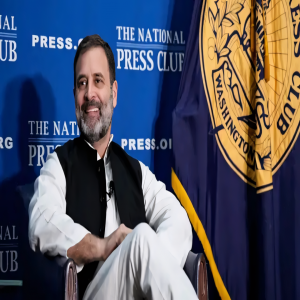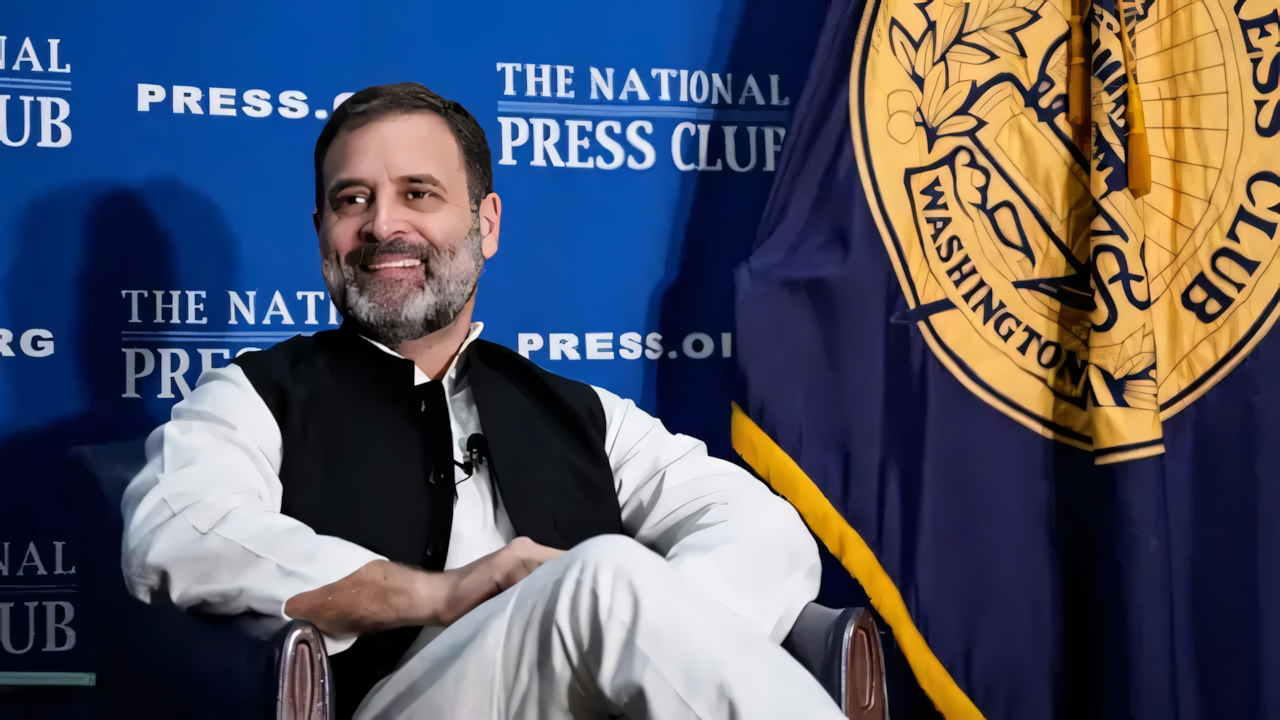

Rahul Gandhi, the Leader of the Opposition, was on a four-day tour to America between September 7 and 10, 2024. He was in great demand. Sam Pitroda, Chairman of the Indian Overseas Congress, said he was 'bombarded' with requests to arrange a meeting with Rahul Gandhi. The Indian community, university students and faculty, intellectuals, media, lawmakers, senior US officials, and the like were eager to interact with him. His tour turned out to be very successful. His interaction with the students, the Indian diaspora and at the National Press Club show his political maturity and the ability to articulate and speak on a variety of intricate topics and issues instantaneously without any notes or a teleprompter. He fielded questions in a freestyle. He comes out as a visionary leader, having a clear idea of India – a secular, liberal inclusion nation – that resonates with the ideals of the founding fathers of the Indian Republic and his great, illustrious great grandfather had cherished.
In a nutshell, Rahul Gandhi said this in America (addressing the Indian diaspora in Dallas, Texas, September 8): "What is missing in our political system and across parties is love, respect and humility. Love to all human beings, not necessarily only people of one religion, one community, one caste, one state, or to those who speak one language. Respect to everybody who is trying to build an India, not just the most powerful, but the weakest; and humility, not in others, but in oneself… RSS believes that India is one idea. We believe that India is a multiplicity of ideas. We believe everybody should be allowed to participate…dream. Everybody should be given space regardless of caste, language, religion, tradition and history."
Responding to a question on how long caste-based reservation would continue in India, during his interaction with the students of Georgetown University, Washington DC, on September 9, he said: "If you look at the Indian government, there are 70 bureaucrats who run the government. Of the 70 people, there is no tribal, three Dalits and three OBCs, a minority… the fact is they aren't getting participation. We will think of ending reservation when India is a fair place. And India is not fair place now" (the next day at the National Press Club, he said his party would increase reservations beyond 50% - the limit the Supreme Court laid down). He spoke about the absence of a level-playing field in the recent Lok Sabha election and said that the BJP would not have secured 240 seats if there had been a level-playing field.
Speaking about the political fight in India, he said: "First of all, you have to understand what the fight is about. The fight is not about politics. That is superficial. The fight is about whether he (pointing to a Sikh in the audience), as a Sikh, is going to be allowed to wear his turban in India, and he, as a Sikh, is going to be allowed to wear a Kada (bracelet), or he, as a Sikh, is going to be able to go to a gurudwara. That is what the fight is about, not just for him, for all religions… what the RSS basically saying is that certain states are inferior to other states, certain languages are inferior to other languages, certain religions are inferior to other religions, certain communities are inferior to other communities, this is what the fight is about."
That is how he was trying to highlight the assault on religious minorities and marginalised sections in India by the extreme rightwing elements, who subscribe to the political Hindutva ideology of the Modi government, and he didn't say that the Sikhs were denied the right to freedom of religion in India. What he said "was in line with his broad political position where he has sought to frame India's domestic political competition as one between the vision based on respect for diversity of all religions, languages, and regions, and commitment to the Constitution and the BJP's vision based on a hierarchical social order and against the Constitution and diversity."
On the final day of his US visit, Rahul Gandhi, interacting with the media at the National Press Club on September 10, was sharp in his criticism of the Modi government's handling of the border face-off with China. He said Modi wasn't able to control China and argued that the Chinese troops had occupied Indian territory in Ladakh. That is a disaster. He asked the anchor: "How would America react if a neighbour occupied 4,000 square kilometers of your territory? Would any President be able to get away with saying that he has handled that well?"
And covering a wide spectrum of topics, he talked about the state of democracy in India, how his party was fighting back and how he was the only person in Indian history to get a prison sentence for defamation: "I can say to you that Indian democracy for the last 10 years was broken. It is fighting back, but it was broken. We fought an election with our bank accounts frozen. I don't know where that happened in any democracy. Maybe that type of thing happened in Syria or used to happen in Iraq."
As usual, instead of responding to the issues raised by the Leader of the Opposition, the ruling party carried a diatribe calling him 'anti-India' and 'anti-national, divisive', out to damage the image of India abroad by willfully misquoting him and associating him with something that he never said. They created a false narrative that he was against the reservation and against the Sikhs. Rahul Gandhi only said what he has been saying in India at public rallies and inside and outside the parliament. The criticism of the BJP-RSS divisive communal politics is deliberately construed as defaming India, forgetting the fact it was Modi who, at umpteen times during his visits abroad, insulted India, even went to the extent of saying that the Indians, before his advent to power in 2014, considered having committed some sin in their previous birth to have been born in India.
Impacted by what Rahul Gandhi said in America, the BJP unleashed a well-orchestrated vilification campaign to discredit and malign him, its rabble-rousers using abusive, violent language. It fielded top ministers to counter him to control the damage and save the party. It is an admission that no single BJP leader is capable of taking on him. To 'refute' Rahul Gandh's hard-hitting criticism of the Hindutva ideology and the governance model, the BJP deployed Narendra Modi, Amit Shah, Rajnath Singh, Shivraj Singh Chouhan, Kiran Rijiju, Hardeep Singh Puri, Assam Chief Minister Himanta Biswa Sharma and Vice President Jagdeep Dhankar. They deliberately twisted and distorted what he had said and set a false narrative, making the truth a causality. It is obvious that they are nervous and worried about the relentless attack on government policies and governance by Rahul Gandhi and his growing popularity in India and abroad. In the free-for-all atmosphere ignited by a rattled BJP, some misguided zealots of the party threatening to harm him physically, whom the Modi government refuses to rein in.
The BJP failed to rebut Gandhi's fundamental accusation that the BJP-RSS views India as 'one idea,' which is against the Congress party's view that India is a 'multiplicity of ideas.' Instead of taking on Gandhi headlong and defending the BJP-RSS Hindu-centric approach, they have accused him of tarnishing and maligning India's image, as if the BJP-RSS is India. The Hindutva agenda that Gandhi keeps slamming is downright indefensible.
As a commentator on foreign and domestic politics, SNM Abdi says, "One doubts whether there are takers any more for such blabbering even among the BJP faithful… The BJP has been gunning for Gandhi since 2014 as it knows too well that if any political party is capable of evicting the BJP from power, it is the Congress party which Gandhi leads." And yet, nothing stopped Modi from restating the false charge against the Congress family, at an election rally in Haryana on September 14, that "if they come to power, they will end reservation for Dalits and the downtrodden." This is how he has been carrying a smear campaign against the Nehru-Gandhi family because he perceives it as a threat to his position.